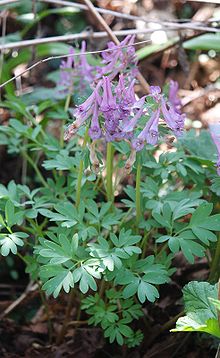Corydalis solida
| Corydalis solida | |
|---|---|
 |
|
| Scientific classification | |
| Kingdom: | Plantae |
| (unranked): | Angiosperms |
| (unranked): | Eudicots |
| Order: | Ranunculales |
| Family: | Papaveraceae |
| Subfamily: | Fumarioideae |
| Genus: | Corydalis |
| Species: | C. solida |
| Binomial name | |
|
Corydalis solida (L.) Clairv. |
|
Corydalis solida, syn. C. halleri, C. transsylvanica (fumewort), is a species of flowering plant in the family Papaveracae, native to moist, shady habitats in northern Europe and Asia. Growing to 25 cm (10 in), it is a spring ephemeral, with foliage that appears in spring and dies down to its tuberous rootstock in summer. It is cultivated for its deeply divided, ferny leaves and narrow, long-spurred flowers which appear in spring. The flowers show color variation, and may be mauve, purple, red, or white.
The species was originally named in 1753 by Linnaeus as the variety solida of his Fumaria bulbosa. It was raised to the species F. solida by Philip Miller in 1771. Its current assignment to the genus Corydalis was made by Joseph Philippe de Clairville in 1811.
Four subspecies are recognized:
The following varieties and cultivars have gained the Royal Horticultural Society's Award of Garden Merit:
...
Wikipedia
